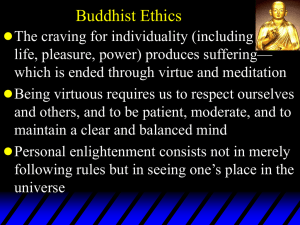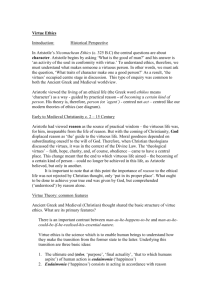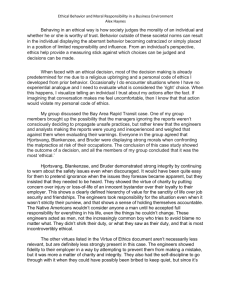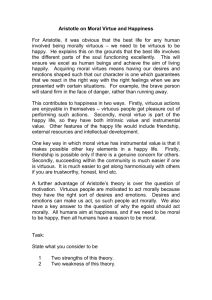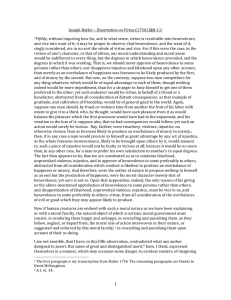Character ethics MBA 2007
advertisement
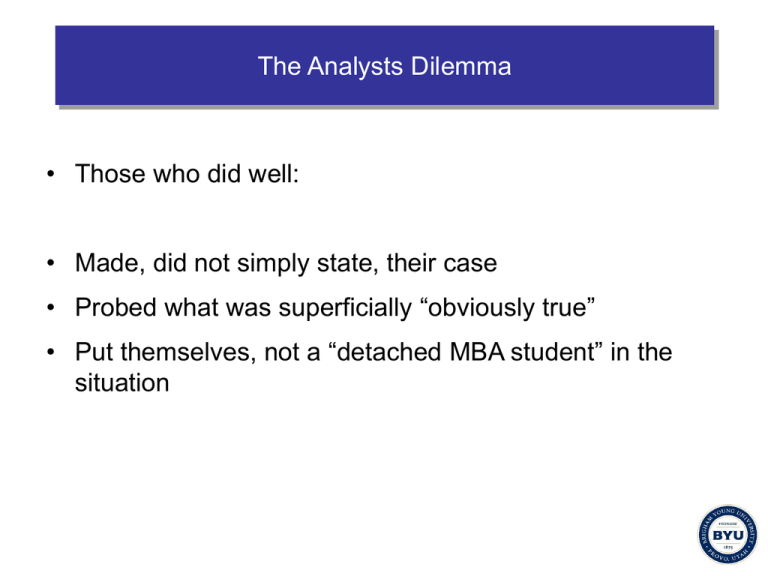
The Analysts Dilemma • Those who did well: • Made, did not simply state, their case • Probed what was superficially “obviously true” • Put themselves, not a “detached MBA student” in the situation Character and Virtue Ethics: 2500+ years of philosophy Paul Godfrey Marriott School Fall 2007 The central thesis or idea • Rules and tools are difficult to use – Situations are flexible and unique – Rules can be rigid – Doing the “utilitarian” math is really hard • Focus on development of character or virtue – It’s virtuous people, not virtuous rules that make decisions – Character and virtue are flexible and can adapt to situations • A problem: both saints and despots use virtue ethics The moral sense and action To say that people have a moral sense is not the same thing as saying that they are innately good. A moral sense must compete with other senses that are natural to humans—the desire to survive, acquire possessions, indulge in sex, or accumulate power—in short, with selfinterest narrowly defined. How that struggle is resolved will differ depending on our character, our circumstances, and the cultural and political tendencies of the day. But saying that a moral senses exists is the same thing as saying that humans, by their nature, are potentially good. James Q. Wilson, The moral sense, p. 12 Adam Smith’s invisible hand Every individual.. . .neither intends to promote the public interest, nor knows how much he is promoting it. By preferring the support of domestic to that of foreign industry, he intends only his own security; and by directing that industry in such a manner as its produce may be of the greatest value, he intends only his own gain, and he is in this, as in many other cases, led by an invisible hand to promote an end which was no part of his intention. . . .By pursuing his own interest he frequently promotes that of the society more effectually than when he really intends to promote it. The invisible hand and virtue • For Smith, the hand may be invisible, but it is not unrestrained • Individuals seeking their own welfare are constrained from within by • Benevolence, sympathy, and love • Prudence, self-control, and discipline Benevolence or Sympathy • All the members of human society stand in need of each others assistance, and are likewise exposed to mutual injuries. Where the necessary assistance is reciprocally afforded from love, from gratitude, from friendship, and esteem, the society flourishes and is happy. (Theory of Moral Sentiments) Prudence and self-control • The man who acts according to the rules of perfect prudence, of strict justice, and of proper benevolence, may be said to be perfectly virtuous. But the most perfect knowledge of those rules will not alone enable him to act in this manner: his own passions are very apt to mislead him; sometimes to drive him and sometimes to seduce him to violate all the rules which he himself, in all his sober and cool hours, approves of. The most perfect knowledge, if it is not supported by the most perfect selfcommand, will not always enable him to do his duty. (Theory of Moral Sentiments) Aristotle on virtue Human good turns out to be activity of soul in accordance with virtue, and if there are more than one virtue, in accordance with the best and most complete. Nicomachean ethics, Bk I, Ch. 7 Aristotle on acquiring virtue Moral virtue comes about as a result of habit, whence also its name ethike is one that is formed by a slight variation from the word ethos (habit). . . the virtues we get by first exercising them, as also happens in the case of the arts as well. . . we become just by doing just acts, temperate by doing temperate acts, brave by doing brave acts. Nicomachean ethics, Book II, Ch. 1. The doctrine of the mean Moral virtue is a mean, then, . . . It is a mean between two vices, the one involving excess, the other deficiency. . . Hence it is also no easy task to be good. For in everything it is no easy task to find the middle, e.g., to find the middle of a circle is not for everyone but for him who knows; so, too, any one can get angry—that is easy—or give or spend money; but to do this to the right person, to the right extent, at the right time, with the right motive, and in the right way, that is not for everyone, nor is it easy; wherefore goodness is both rare and laudable and noble. Nicomachean ethics, Bk. II, Ch. 8 Aristotle’s Virtues and vices • Courage • Good Temper • Temperance • Friendliness • Liberality • Truthfulness • Magnificence • Ready wit • Pride • Justice • Ambition



